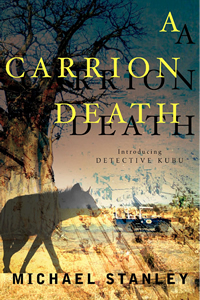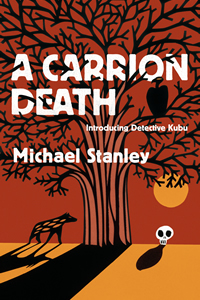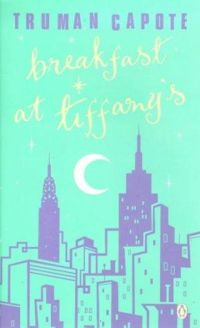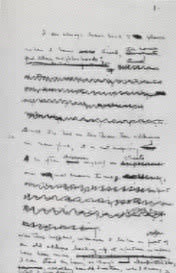Yes, you guessed it: this is another exercise in expanding your expectations for what reality can look like. So — what do you think this picture depicts?
Give it some thought.
This pitch-preparing series been a long, dusty road so far, hasn’t it? Trust me, all of this intensive work will feel very worthwhile indeed ten minutes before your first scheduled pitch meeting. Or thirty-two seconds into your first hallway pitch.
Feeling positively faint at the prospect of the latter? Don’t worry; more timorous souls than you have braved the hallway pitch and survived it. They may not have enjoyed it while it was going on, but I’ve never had a pitching student keel over at the moment of truth yet.
Honest. I wouldn’t put you through the pain of creating an elevator speech unless I were very confident that you’d actually be able to put it to some use.
And yet, I feel as though I have been discussing elevator speeches — those 3-4 line gambits for use in informal pitching situations, as opposed to the 2-minute pitch reserved for formal appointments and other actual sit-down conversations — so intensely over the past few days that I may be inducing a phobia of lifts in my readers. (Not the shoes, the elevators.)
To clear the air: you have my permission to get into an elevator with an agent or editor without pitching, if you so desire.
But I am going to ask something else of you. Here and now, raise your dominant writing hand (or both of ’em, if you work primarily on a keyboard) repeat after me:
“I hereby solemnly swear that I shall not have learned the magic first hundred words and elevator speech in vain. The next time I attend a writers’ conference, I will pitch to at least three agents or editors with whom I do NOT have a previously-scheduled appointment.”
Okay, you can put your hand down now — and I’m going to hold you to that, you know.
Why? Because I know from experience that the only thing better than walking out of a conference with a request to send pages to an agent you like is walking out with 5 requests to send pages to agents you like, I always say.
So let’s get back to work, shall we?
As I have been going over the logic of the elevator speech, I could hear your NF writers out there grumbling, “This is all very well for a novel, but how does all this apply to a MY book?” (Bloggers develop tremendously acute senses of hearing, you see. That rumble I just heard was slight settling on mile 32 of the Great Wall of China.)
Calm your grumbles, oh memoir-writers and pursuers of fact. Today, I am going to deal with your plight very specifically.
In an elevator speech for a NF book, your goal is the same as for a novel: to intrigue your hearer into asking follow-up questions, or even the entire 2-minute pitch.
Which I am GETTING TO, people. Hold onto those proverbial horses.
But while a novelist can simply spring his premise on the nearest agent or editor within shouting distance, the NF writer needs to use a little more finesse. Especially if the book in question happens to be a memoir.
The key here is not to try to stuff too much information into your elevator speech. As with a novel, you do not want to tell so much about the book that the agent or editor to whom you are speaking feels that you have told the whole story.
Remember, the elevator speech is the first course, not the entrèe. No version of a pitch should give the impression that there’s no need to read the book.
I can tell you from long experience as a pitching coach: many, many pitches do convey precisely that impression, because they go into far, far too much detail. Heck, I’ve heard pitches that took 15 minutes to get to page 36 of the book.
Trust me, you will want to leave enough of a question hanging in the air that your listener will say, “Gee, that sounds intriguing. Send me the first 50 pages,” rather than, “God, this person has been talking for a long time. I wonder if room service would bring a drink and a snack to me here in the appointment lounge.”
I can already feel those of you who’ve pitched NF at conference shaking your heads. “Yeah, yeah,” these weary souls point out, “obviously, I want to make the book sound like an interesting story. But as any NF writer who has ever come within 50 feet of an agent or editor can tell you, the first question anyone in the industry asks us is, So, what’s your platform? If you aren’t already famous for being an expert on your subject matter, or famous for being famous, it seems as though they don’t even listen to the story you’re pitching.”
Well, in my experience, that’s not quite true — they do listen to the story a NF writer is pitching. But you’re quite right that they will want to know right away what that writer’s platform is.
A platform, for those of you new to the term, consists of whatever in the writer’s background, experience, birth, credentials, connections, research, etc. that would enable her agent to say truthfully, “Oh, the author is an expert in this area.” Or, at any rate, to be able to claim that people in the general public will already recognize the author’s name.
Which isn’t, contrary to what many aspiring writers believe, always a matter of fame. Basically, your platform is the answer to why are you the best-qualified person in the universe to write this book?
And no, for a memoir, simply being the protagonist who lived through the events described in the book is NOT necessarily a sufficient platform, in the eyes of the industry. So if you’re a memoirist who is planning to pitch, you’re going to need to come up with a better answer for, “So, what’s your platform?” than “Well, I lived through it,” or “It’s about ME.”
Sorry to be the one to break that to you.
Having successfully pitched a memoir myself, I have to say, I’m not a big fan of allowing an agent or editor to ask that particular question. I prefer to anticipate it in both the elevator speech and pitch.
In other words, I believe that any really good NF pitch should establish the author’s platform as the best conceivable writer of the book, BEFORE anyone thinks to ask about it.
Piece o’ proverbial cake, right, to pull that off in a 30-second speech?
See why I made you figure out what your book’s marketing points, including your qualifications, BEFORE I let you anywhere near anything that remotely resembled a pitch? During a hallway meeting is a lousy time to brainstorm about your platform, after all — and not being prepared leaves you prey to nagging doubts when agents and editors say from the podium (as someone invariably does at every writers’ conference ever given atop the earth’s crust), “Well, unless a writer has a good platform, it’s not possible to sell a nonfiction book.”
I can’t imagine how aspiring writers hearing this could have derived the impression that only the already-famous need apply, can you?
The fact is, though, MOST NF books are written by non-celebrities — and even by people who aren’t especially well-known in their respective fields. Literally millions of NF books are sold each and every year — and few of their authors are the Stephen Hawkings of their respective fields.
How is that possible, you ask? Let me whisper a secret to you: great platforms are constructed, not born.
If you’re not certain why you’re the best-qualified — if not the only qualified — writer currently wandering the face of the earth to tap out your NF book, you’re going to be pitching at a severe disadvantage.
(If you’ve been feeling queasy for the last few paragraphs because you don’t know what your platform is, run, don’t walk to the right-hand side of the page, and check out the posts on YOUR BOOK’S SELLING POINTS, PLATFORM, and NONFICTION MARKETING categories for a bit of inspiration.)
I’m sensing some uncomfortable shifting in seats out there. “But Anne,” a few of you protest, “this sounds like a whole heck of a lot of work without a very clear pay-off. Obviously, my memoir is about ME — why do I have to prove that I’m the best-qualified person to write about MY life>:
You’d think so, wouldn’t you? Yet, as I’ve pointed out many times in this blog, a memoir is ALWAYS about something in addition to its protagonist — and in order to establish your platform, you will need to demonstrate that you’re qualified to write authoritatively on that background issue, too. Because, you see, it just doesn’t make sense to expect the person hearing your pitch to guess what your background is.
For example, if you grew up in a traveling circus, you would probably have some pretty interesting stories to tell — but that will not necessarily be obvious to an agent or editor to whom you’re pitching unless you DEMONSTRATE that your first-hand knowledge renders you a credible expert with an intriguing, unique point of view on the subject.
As with a novel, introducing specific, unusual details is usually the best way to achieve this.
It would not necessarily establish your platform as a circus kid to say, “Look, I was the little girl watching from beneath the bleachers,” because to an outside observer, that little girl wouldn’t necessarily have seen anything different than what any audience member did. But if you were more specific about how YOUR experience was unique, you more or less automatically sound credible: “By the time I was five, I had graduated to riding the lion during the circus parade,” for instance, would be a real show-stopper in a pitch.
Once you’ve figured out what makes your point of view unique, making the case that you are the best person currently living to write about it will become substantially easier, no?
It’s much, much smarter to think in advance about what makes your point of view unique and work it into your informal AND your formal pitches than to try to wing it in the moment. By including some indication of your platform (or your book’s strongest selling point) in your elevator speech, you will forestall the automatic first question of any NF agent: “So, what’s your platform?”
This same strategy will work with any NF book, believe it or not. What is unique about your take on the subject — and does your special point of view offer your reader that other books in this are do not?
Don’t boast — be specific and practical. Demonstrate what the reader will learn from reading your book, or why the book is an important contribution to the literature on your subject.
With a strong grasp of your selling points to build upon, you can use your elevator speech in much the same way that a novelist might: to provide specific, vividly-drawn details to show what your book offers the reader.
In other words, you will want make it clear in your elevator speech what your book is and why it will appeal to your target market. Here’s an example:
Swirling planets, the Milky Way, and maybe even a wandering extraterrestrial or two — all of these await the urban stargazing enthusiast. For too long, however, books on astronomy have been geared at the narrow specialist market, those readers possessing expensive telescopes. ANGELS ON YOUR BACK PORCH opens the joys of stargazing to the rest of us. Utilizing a few simple tools and a colorful fold-out star map, University of Washington cosmologist Cindy Crawford takes you on a guided tour of the fascinating star formations visible right from your backyard.
See? Strong visual imagery plus a clear statement of what the reader may expect to learn creates a compelling elevator speech for this NF book. And did you notice how Prof. Crawford’s credentials just naturally fit into the speech, obviating the necessity of a cumbersome addendum about platform?
I told you that it was all about finesse.
Try reading Dr. Crawford’s elevator speech out loud: feels a little awkward to be tooting the author’s horn quite that much, doesn’t it? We writers tend to be rather unused to describing our own work in such unequivocal terms, so I always advise trying it out for oneself — say, a few hundred times.
There’s nothing like practice for learning the ropes, so it’s not a bad idea to buttonhole a few like-minded writers and figuring out elevator speeches for THEIR books, too. I know it sounds wacky, but learning to pitch other people’s books is a great way to get comfortable with the style.
Remember, your elevator speech should be entertaining and memorable, but leave your hearer wanting to know more. Don’t wrap up the package so tightly that your listener doesn’t feel she needs to read the book. Questions are often useful in establishing WHY the book needs to be read:
EVERYWOMAN’S GUIDE TO MENOPAUSE: “Tired of all of the conflicting information on the news these days about the change of life? Noted clinician Dr. Hal Holbrook simplifies it all for you with his easy-to-use color-coded guide to a happy menopausal existence. From beating searing hot flashes with cool visualizations of polar icecaps to rewarding yourself for meeting goals with fun-filled vacations to the tropics, this book will show you how to embrace the rest of your life with passion, armed with knowledge.
Okay, here’s a pop quiz for those of you who have been following this series from the beginning: what techniques did NF pitcher Holbrook borrow from fiction writing?
Give yourself at least a B if you said that the writer incorporated vivid sensual details: the frigid polar icecaps, the twin heat sources of hot flashes and tropical destinations. And make that an A if you noticed that the savvy pitcher used a rhetorical question (filched from Dr. Holbrook’s keynote, no doubt) to pique the interest of the hearer — and double points if your sharp eye spotted the keywords agents love to hear: happy, passion.
Extra credit with a cherry on top and walnut clusters if you cried out that this elevator speech sets up conflicts that the book will presumably resolve (amongst the information popularly available; the struggle between happiness and unhappiness; between simple guides and complicated ones). Dualities are tremendously effective at establishing conflict quickly.
Speaking of odd sensual details and dualities, have you come to any conclusion about the picture at the top of this post? Looks kind of like light reflected off water, doesn’t it? Or a very heavy rain falling through the air, perhaps?
Actually, it’s a photograph of a granite-tiled patio on a sunny day. Completely different level of hardness than water or air, similar effect.
Which only goes to show you: first impressions are not always accurate. Sometimes, a surface that initially appears to be wavering is as solid as stone; sometimes, an author who doesn’t at first seem to have many qualifications to write a book turns out to have precisely the right background for presenting a fascinating new take on the subject.
I’m just saying that the world is a pretty complex place.
Practice, practice, practice, everybody — next time, we get to the prize at the bottom of the box of Cracker Jacks. Or one of ‘em, at any rate.
Keep up the good work!































